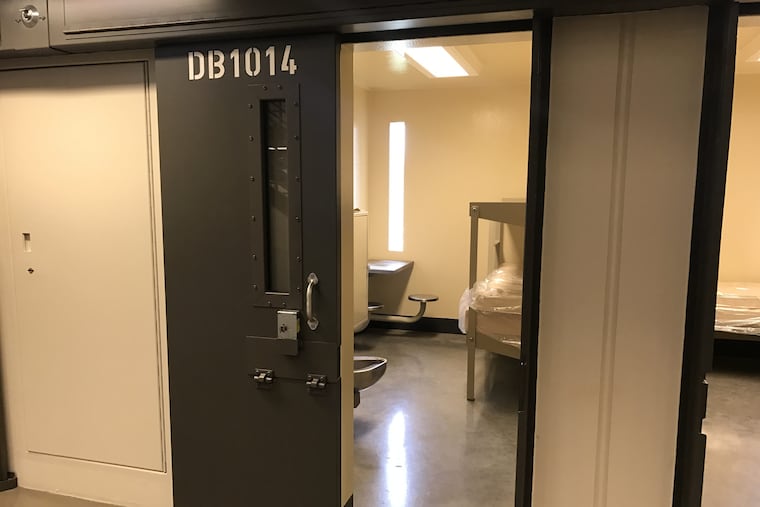State prosecutors say prison psychologist was negligent. The DOC promoted him.
Prosecutors allege Harrington failed to investigate reports of an inmate with serious mental health needs drinking out of a toilet, and that he allowed staff to force the inmate to sing, "I'm a little teapot."

HARRISBURG — Five years after the U.S. Department of Justice investigated the Pennsylvania Department of Corrections for its treatment of inmates with serious mental illness — and found that punitive treatment and unconstitutional use of solitary confinement at the now-closed Cresson state prison had contributed to three prisoner suicides — the top psychologist manager at that prison, James Harrington, is still on the department payroll. In fact, he's been promoted.
He's one of four regional psychologist managers statewide, overseeing staff at several prisons at a salary of $101,575 per year. "Mr. Harrington was one of our strongest licensed psychologist managers," Corrections Secretary John Wetzel said Thursday in explaining the promotion.
Now, prosecutors for the Pennsylvania Department of State want to revoke Harrington's license to practice psychology and extract significant civil penalties.
In two weeks of hearings that concluded Thursday, they sought to prove to the state Board of Psychology that Harrington provided negligent, incompetent, inadequate, or unprofessional care. The probe, launched in response to the 2013 Department of Justice findings, focused on the cases of five inmates housed from 2010 to 2013 at Cresson, in Cambria County.
Prosecutors allege that Harrington failed to investigate reports of an inmate with serious mental-health needs drinking out of a toilet, and that he allowed staff to force the inmate to sing "I'm a Little Teapot." They also say he failed to report serious abuses, and retaliated against his staff if they made such reports.
Harrington's lawyer, Allan Tepper, said in closing arguments that "there are real questions of credibility" around the witnesses who reported those incidents. (He declined to comment on the case outside of proceedings or to make Harrington available.)
Harrington, not the Department of Corrections, was the subject of this investigation — but it comes at a time when mental-health treatment continues to be a pressing challenge for the department. The department undertook numerous reforms following the Justice Department report and a legal settlement. Those reforms included an agreement to stop housing inmates with serious mental illness in restricted housing and instead create new mental health treatment units.
The number of suicides in state prisons this year, 14, matches last year's total, which was the highest in two decades. Meanwhile, the number of attempted suicides recorded within state prisons has more than doubled since 2014.
>>READ MORE: Why are so many Pa. prison inmates committing suicide?
That coincides with a dramatic increase in the number of inmates classified as seriously mentally ill. Today, one in three state prisoners is on the mental health roster, according to the Corrections Department. One in 11 is considered seriously mentally ill.
A spokesperson said in a statement in September that the Corrections Department is closely monitoring care and undertaking quarterly and annual reviews of every state correctional institution, and has hired new psychology staff, including seven new licensed psychologist managers. It also added one more regional licensed psychologist manager, the same position Harrington holds.
Other improvements have included undertaking clinical reviews of serious suicide attempts and suicides, and distributing updated suicide prevention recommendations to all state prisons.
Prosecutor Heather McCarthy, however, put the responsibility squarely on Harrington: "He found himself within a broken system — and his actions within that system, or his inactions, became ethical failures."
She said he failed to meet his professional obligations while failing to prevent violations of the Americans With Disabilities Act and the Eighth Amendment's requirement for humane conditions of confinement.
In some cases, she said, records show he denied therapy even as patients deteriorated. One prisoner, described in filings as C.B., was referred by a psychiatrist who described his history of self-harm with the notation: "Please see regularly." According to the prosecution, Harrington denied the referral and prescribed only "routine contact," up until the man attempted suicide in July 2011.
Another, J.M., repeatedly announced his plan to kill himself, but was never seen by Harrington; after just two months at Cresson he took his own life in May 2011. Just beforehand, according to McCarthy, psychology staff noted that J.M., who had been aggressive and depressed, was suddenly upbeat — a mood shift that's an indicator for suicide. According to prosecutors, Harrington wrote in the incident report that J.M.'s death was not foreseeable or preventable.
Then there was T.P., the prisoner at the center of what became known at the hearing as "the teapot incident." According to McCarthy, T.P later attempted suicide. "He deteriorated to the point of having virtually no ability to lift himself up or to talk. Pennsylvanians deserve better," McCarthy said.
Wetzel, in his testimony Thursday, cast doubt on some of the claims.
He said he personally investigated the "teapot incident," which he said had concerned him deeply. "It's ridiculous," he added. "It's embarrassing." But he came away with the understanding that Harrington had not been responsible.
He added that at the time, care for prisoners on the mental health roster was not always prioritized.
"At that time, in the department, security trumped everything," he said. "That was a weakness in the system."
For now, Harrington remains in his role at the department. Both sides will submit post-hearing briefings over the next several months before the board comes to a decision. In addition to the suspension of his license, Harrington could face tens of thousands of dollars in civil penalties.